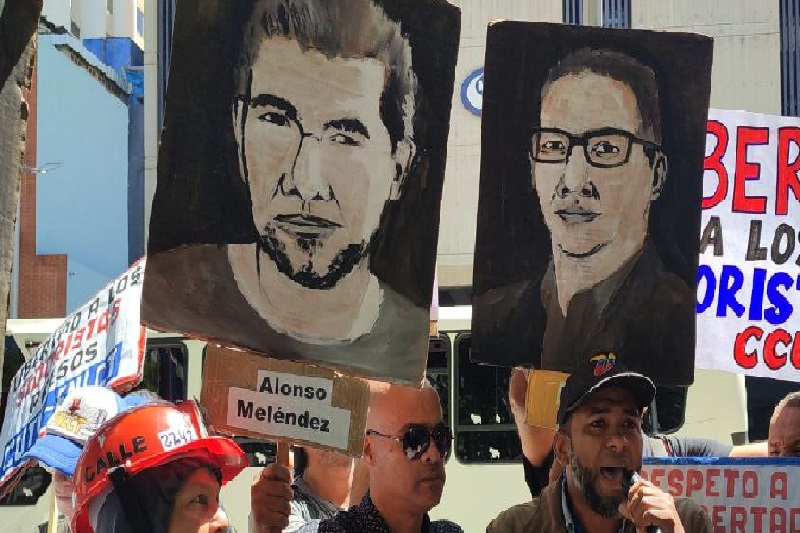
venezuela metalworkers demand labour rights, stop protesting criminalization
Venezuelan industrial workers and social movements demanded the immediate release of two trade union leaders detained during protests at state-owned steelmaker Siderúrgicas del Orinoco (Sidor) in Ciudad Guayana, Bolívar state.
Daniel Romero and Leonardo Azócar were arrested on June 11 after a five-day sit-down strike with hundreds of metalworkers to urge the company’s board to adjust salaries to rising living costs and reinstate health insurance and collective bargaining rights. Juan Cabrera, a third worker, was detained but released hours later.
Carlos Villarroel, a Sidor worker, delivered a letter to the Attorney General’s Office in Caracas on Wednesday demanding the union leaders’ release. Demonstrators also demanded protection for workers protesting for their constitutional rights and an end to the military occupation of the company.
Romero and Azócar’s “unfair detention” stems from a nationwide state policy to criminalize labor protests.
“We are demanding justice for our detained companions whose only crime is defending our wage claims,” Villarroel declared. “We want attorney general Tareck William Saab to stand with workers and stop being an instrument of the current criminalization drive.”
Keep Reading
Prosecutors met briefly with demonstrators and promised to review the case. If the two workers were not released within a week, activists promised another rally.
In a “rigged hearing,” a Bolívar state tribunal charged union leaders with incitement to hatred, criminal association, and boycott, according to lawyer and human rights activist Eduardo Torres. The two detainees were taken to Caracas but have not been able to speak to their families or lawyers.
Torres also denounced a local judge’s June 13 order banning protests, threatening union leaders and metalworkers with jail time. The judicial order lists 15 strike-prohibited people.
During Wednesday’s rally, CUTV trade union leader Pedro Eusse called on the Venezuelan working class and popular movements to rise up in the struggle, mobilize, and stand in solidarity with those being criminalized by the state.
After the Sidor board refused to discuss labor issues, hundreds of pellets plant workers walked out on June 7.
Sidor workers also want to rehire people fired in 2020 without cause and those on a “non-required” list. César Soto, affected by this measure, told the local press that workers forced to stay home receive less than US $60 a month. Sidor had 7,000 workers until February.
Following May 1’s announcement, active Sidor workers earn $200 in monthly wages and $80 in government bonuses, according to Soto. Metalworkers want an immediate salary increase because the country’s basic food basket costs over $500.
In January, Sidor workers blocked a Ciudad Guayana highway with the same demands. Several protesters were arrested, with most released quickly and some placed under a “non-required” modality. The board agreed to form a dialogue committee, but it never did.
In a broad anti-corruption investigation, Sidor president Néstor Astudillo and Basic Industries Vice-Minister Pedro Maldonado were arrested on March 30. Maldonado also led the Venezuela Guayana Corporation (CVG), which includes Sidor and other eastern Venezuelan heavy industries.
After the arrests, Venezuela appointed a “Intervention Board” led by Productive Economy Vice-Minister Héctor Silva and National Assembly (AN) deputy Alexis Rodríguez Cabello. Colonel Sandi Villarroel Rodríguez replaced Silva in April.
Before the corruption scandal, President Nicolás Maduro visited Sidor and ordered the company to prioritise workers. “We must produce more and invest in the working class, collective bargaining contracts, and their rights,” he said.
Sidor was founded in 1953 and nationalized by Hugo Chávez in 2008, leading to worker control experiments before a state-led, top-down management model was imposed. The country’s economic crisis, US sanctions, migration, and reduced investment and maintenance have hurt the steelmaking complex in recent years.
Sidor recovered in 2022, producing 230,000 tonnes of steel, or 6% of its installed capacity. After years of paralysis, pellets plant Line “A” produced 122,459 tonnes in January.
In recent months, oil, teacher, and public sector workers have joined eastern Venezuelan steelworkers in demanding fair wages and new collective contracts. Instead of raising the minimum wage, the Maduro administration raised non-wage bonuses on May 1.









